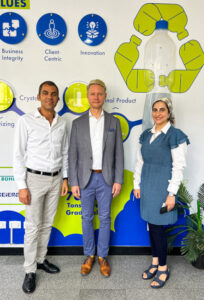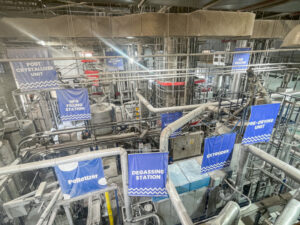Bottle-to-bottle recycling in Egypt
rPET pioneer from the Greater Cairo region focuses on huge capacity expansion
The recycling plant of rPET producer Bariq is located in the west of the 6th of October City, the largest industrial and business city in Egypt and part of the Greater Cairo region. On 23,000 m2 of production space, the pioneering PET recycler in the MENA region currently creates a total capacity of 35,000 t/a of food-grade rPET material, which is FDA, EFSA and Reach & Health Canada regulation compliant. And while we were still watching the whole thing live on site at the Middle East Road Show, the final adjustments were already being made to a recently acquired third line, which is also due to start production next month, increasing capacity to 55,000 t.
Meeting with Bariq // September 8, 2024
We met:
Mr Ahmed Abdel Fattah, CCO
Mrs Nour El Gammal, Marketing Manager
Mr Abdul Rahman, Production Engineer

The company was officially founded and built in 2011 as the first recycling plant for PET in the country. It began operations in 2012, at that time still as part of the Egyptian investment conglomerate Raya Holding and with a Starlinger RecoStar PET 165 iV+ with ViscoStar 150 SSP reactor. “At the time, we simply wanted to be the first on the market to tackle the issue of rPET,” explained CCO Ahmed Abdel Fattah in an interview. Having been in office for just two months, he is still very new to the company. He previously worked in the gas and oil industry for almost two decades, specifically in LPG trading and operations.
The first sales markets were initially outside Egypt. Ten years its foundation, Raya Bariq sold the company in 2021 to the Egyptian Intro Group, which also invests in various industrial segments. The group includes the Intro Sustainable Resources (ISR) and Intro Resource Recovery (IRR) segments, under whose umbrella Bariq plays the central role in the closed loop: IRR’s ‘Dawar’ app, a digital waste management system, can be used to report waste for collection, for example. The ‘Environ Adapt’ business unit offers the tracking of collected waste, which ultimately ends up at Bariq for processing.

Since the sale to Intro, Bariq has been aiming for massive expansion. In 2022, the plant received its second Starlinger line, a RecoStar PET art line iV+ which is the first and only art line installed in the region and the second in the world with ViscoStar 350 SSP reactor, and has now managed to triple its capacity in less than three years with the new, third recycling line, a RecoStar PET 215 iV+ with ViscoStar 350 SSP reactor. In addition to the Starlinger lines, grinders from STF, autosort systems from Tomra, washing lines from Amut and sorting equipment from Bühler and Sesotec are also in use. An estimated 60% of the PET bottles required come from the company’s own market, the rest is imported, for example from the EU, as we learn during the tour. Bariq is the only non-European recycling company that is registered with the Spanish organisation Ecoembes and is therefore part of the tendering process for bottle recycling. As in many parts of the world, the collection of PET bottle waste in Egypt is, with a few exceptions, still heavily dependent on the unorganised sector. Bottles are taken to collection centres and then end up at Bariq for processing, often with better initial quality than the imported bales.

The recyclate, around 90% of which ends up back in packaging such as PET bottles, is sold worldwide. Customers include Pepsi, Niagara, Nestlé, Coca-Cola, Retal and Alpla. The remaining material ends up in non-food applications, such as at Henkel or L’Oréal. “Our main markets are the EU and USA with over 90% exports,” explained Mr Fattah. “The rest remains in the Middle East and Egypt, where rPET is still in its infancy in bottle production. At present, recycled material in contact with food is still often perceived by the population as contaminated and therefore anything but positive. But awareness of this is gradually changing, so that we are slowly but surely seeing positive signals in the handling of recycled PET. We would like to contribute to recycling processes and the circular economy for plastics being perceived as a kind of ‘social plastic.”
The company is currently building another plant in Jeddah, Saudi Arabia, which is expected to be completed in early 2025. An Erema Vacurema Prime will be used there together with an initial annual capacity of 15,000 t before plans are made to increase this to 55,000 t in the medium term, as in Egypt.
Photo top: F.l.t.r.: Nour El Gammal, Ahmed Abdel Fattah and Kay Barton in front of the Editourmobil

